Vice President's Secretariat
Vice President calls for strengthening the space for discussion and dialogue in public realm
‘Media should introspect, pass on the mike and let unique, marginalized voices come to the mainstream’
‘Time to step out of our echo chambers of social structures and social media algorithms’: VP
VP underlines the role of intelligentsia in preserving ‘societal morality’; calls upon civic society to speak upon prevailing issues
Vice President Jagdeep Dhankhar inaugurates third edition of ‘Lokmanthan’
VP visits Kamakhya Temple in Guwahati, offers prayers
Posted On:
22 SEP 2022 2:49PM by PIB Delhi
The Vice President, Shri Jagdeep Dhankhar today called for strenthening the thriving space for discussion and dialogue in public realm, suggesting that ‘intolerance of others’ point of view is antithetical to the vision of free exchange of thought’.
Recalling that India has a great heritage of debate, discussion and knowledge sharing, the Vice President said that lessons can be drawn from the past to uplift the quality of discussions in public domain, especially legislatures.
Shri Dhankhar added that in the ‘race for one-upmanship and under the constant glare of the public eye, debates – televised or on social media – are turning into cacophonous fighting arenas’. He called upon media to take the initiative, introspect, “pass on the mike and let unique, original and marginalized voices come to the mainstream”.
Calling for healthy, open-minded discussions, the Vice President said it is “time to step out of our echo chambers – caused by both social structures and social media algorithms – and let our mind breathe”. “We must revive the art of listening; we must rediscover the art of dialogue”, he stressed.
The Vice President was inaugurating the third edition of a national colloquium ‘Lokmanthan’ organized by Prajna Pravah in Guwahati today. Appreciating the organizers for highlighting the rich cultural ethos of North Eastern India, Shri Dhankhar observed that in their diversity, “the cultural practices of the region resonate with the quintessential Indian values of peace, harmony and universal brotherhood”.
Addressing the gathering, the Vice President underlined the role of intelligentsia in Indian society, referring to how sages advised kings historically on issues of policy and ensured harmony and stability in society. Calling upon intellectuals to speak upon prevailing issues, he said that “if our intelligentsia decides to opt for silence in the current times, then this very important section of society is bound to be silenced forever. They must freely practice dialogue and deliberation so that societal morality and propriety are preserved”.
Underscoring the primacy attached to Freedom of Expression in the Constitution and the rich quality of Constituent Assembly debates, the Vice President said that they are a testimony to the importance of free-spirited and healthy discussion that India has long cherished. “Freedom of expression is the nectar of democracy”, he said.
The Vice President called upon the intellectuals from the civic society to play a proactive role in ensuring the harmonious balance of the three branches of the state – Legislature, Executive and Judiciary – through deliberative mechanisms. “Democratic values and human rights will certainly blossom with intelligentsia adopting proactive stance of dialogue and discussion”, he added.
Reflecting on the “common cultural thread” among all Indians, Shri Dhankhar observed that the beauty and strength of ‘our ‘indubitable cultural unity’ reflects in every facet of our national life. Right from the mundane, secular matters to the lofty spiritual aspects – from the songs sung by farmers during the sowing season to our holistic approach towards environment – the underlying oneness of Bharatiyata can be felt’.
In this regard, the Vice President called for developing “a sense of our own history, which includes folk traditions, local art forms and innumerous dialects. Only then can we be truly independent in mind and spirit”. He also called for empowering the youth to think for itself and be equipped with “not only with the right skill set, but also with the right mindset”.
During the event, the Vice President witnessed a traditional Assamese religious dance performance, ‘Gayan Bayan’. He also released two books – a souvenir for Lokmanthan and a collection of speeches of the Chief Minister, Dr. Himanta Biswa Sarma, titled ‘In Pursuit of a Dream’.
Later in the day, the Vice President reached the Raj Bhawan, Guwahati where he interacted with eminent personalities from the state. Thereafter, Shri Dhankhar along with his spouse, Dr. Sudesh Dhankhar visited the renowned Kamakhya temple in Guwahati and offered prayers.
Prof. Jagadish Mukhi, Governor of Assam, Dr. Himanta Biswa Sarma, Chief Minister of Assam, Shri J. Nandakumar, National Convenor, Prajna Pravah, Dr. Gargi Saikia Mahanta, Working President, Lokmanthan 2022 and other dignitaries were present during the event.
Pictures of the event –
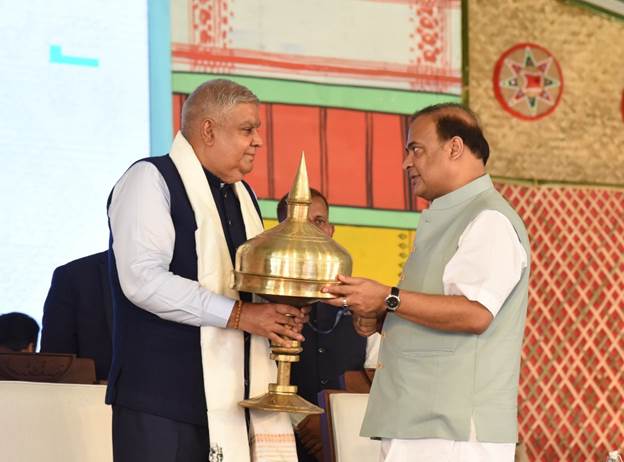
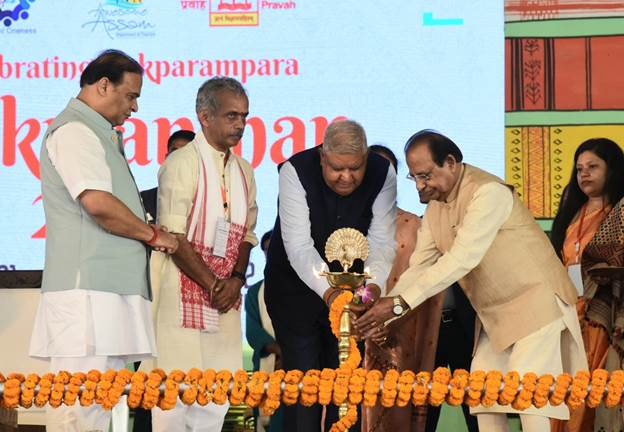
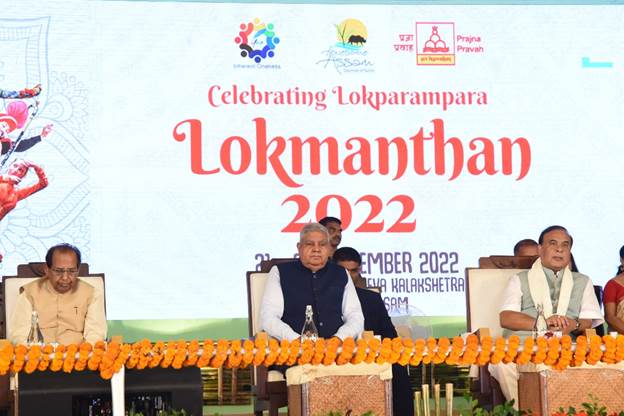
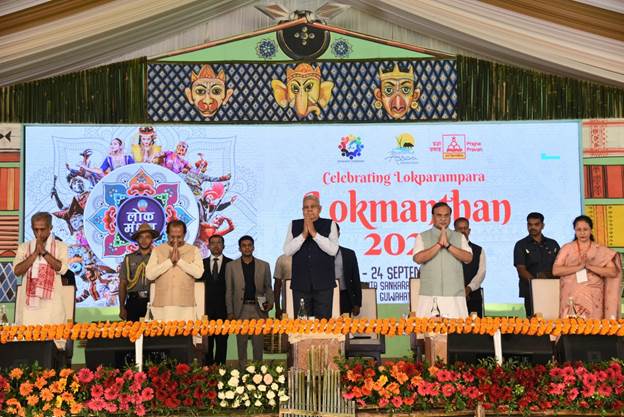
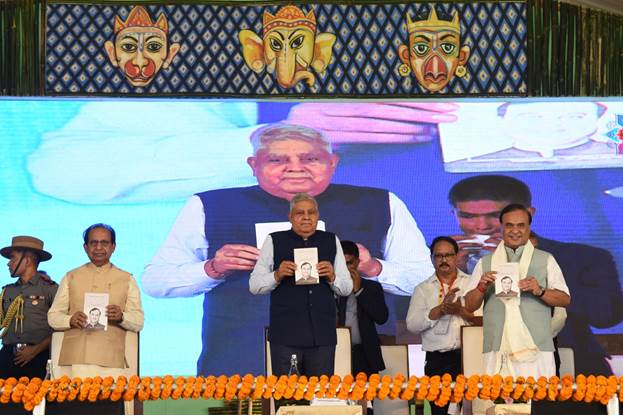
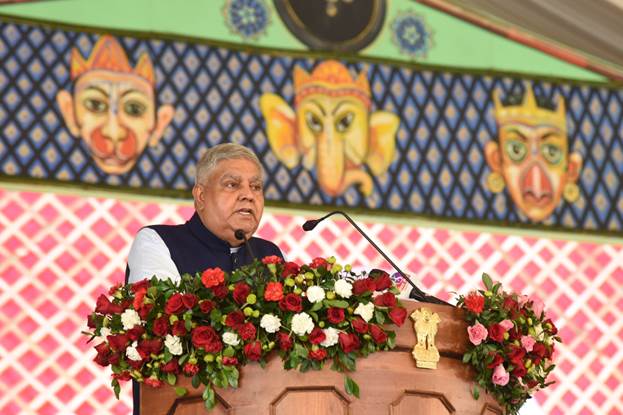
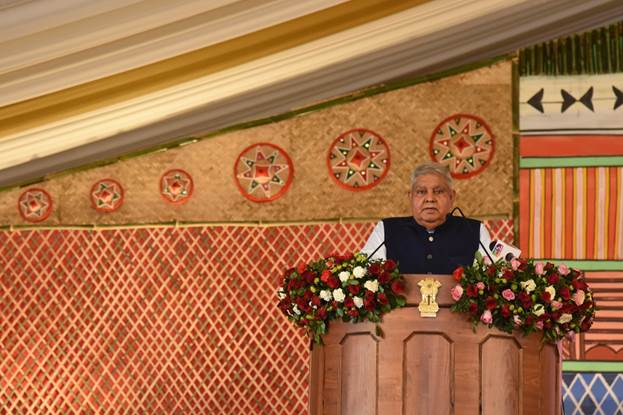
Following is the full text of the speech:
“Privileged to be associated with this inaugural session of the third edition of लोकमंथन in Guwahati today.
It is satisfying to learn that लोकमंथन 2022, with the theme of लोकपरम्परा, is celebrating the culture and ethos of North Eastern India and facilitating a dialogue between artists, intellectuals and academicians drawn from different parts of the country to recognise many historical traditions of India.
Compliment Prajna Pravah for organising this national level colloquium over the years to bring out the hidden treasures of our traditional knowledge. Warm regards to the local organisers, Intellectual Forum of North East (IFNE) and Assam Tourism Development Corporation (ATDC) for their earnest productive efforts.
India has a great unrivalled heritage of debate, discussion, knowledge sharing, public discourse, and intellectual brainstorming. In ancient times, there was a healthy space where debates were conducted to examine various religious, philosophical and moral issues. Indian epics like the Bhagavad Gita are an in-depth contemplation on morality and philosophy in the form of dialogue.
Dialogue, Debate and Discussion are soul of governance. Contemporaneous scenario on this count, particularly in legislature, is worrisome. Entire eco system upliftment can be effected by drawing lessons from our rich past.
The great Brihadaranyaka (बृहद्वाराण्यका) Upanishad itself was firmed upon discussions such as the Yagyavalkya-Gargi dialogue, in which the sage Gargi Vachaknavi participates in a philosophic debate, challenging the sage Yagyavalkya (याज्ञवल्क्य) with intriguing questions on the issue of atman.
लोकमंथन seeks to revive and revitalise our age-old Bharatiya tradition of Samvada (संवाद). Our concept of Samvada (संवाद) is not mere transmission of information but positive and constructive communication.
The thriving space for discussion and dialogue that once existed in the public realm must be regained and protected from the many dangers it faces. In a race for one-upmanship and under the constant glare of the public eye, debates – televised or on social media – are turning into cacophonous fighting arenas.
Intolerance of the other point of view is antithetical to wholesome envisions of free exchange of ideas and thoughts. This trend needs containment so that societal harmony is enriched.
Media should take the initiative here – they should introspect, pass on the mike and let unique, original and marginalized voices come to the mainstream.
Time to step out of our echo chambers – caused by both social structures and social media algorithms – and let our mind breathe. We must revive the art of listening; we must rediscover the art of dialogue.
The role of intellectuals in our country is very critical. Historically, sages – the highly enlightened souls of the time – advised the kings and royalty on various aspects of polity and policy. These sane voices were heard by all sections of people, ensured harmony and stability in society and gave legitimacy to the law of the land.
In this background, if our intelligentsia decides to opt for silence in the current times, then this very important section of society is bound to be silenced forever. They must freely practice dialogue and deliberation so that societal morality and propriety are preserved.
Democratic values and human rights with certainly blossom with intelligentsia adopting proactive stance of dialogue and discussion
The primacy attributed to the Freedom of Expression in our Constitution, something other modern nations took much longer to achieve, is a testimony to the importance to free-spirited and healthy discussion that we have long cherished. Freedom of expression is nectar of democracy.
The Constituent Assembly Debates are replete with many enriching and intriguing dialectics that illuminates India’s founding fathers’ emphasis on deliberative mechanisms. This mechanism by itself paves way to resolution of many issues facing as today.
The framers of the constitution have envisioned a wholesome balance between the three institutions – Legislature, Executive and Judiciary – emphasizing on the synergy between the three. Even here, the affirmative role of intelligentsia will fructify in healthy outcomes.
Be it from the legal community, public representatives, the executive or even well-meaning thinkers from the civic society, each one has to ensure the harmonious working of the three branches of the state through deliberative mechanisms. Any transgression howsoever non-invasive, subtle and well meaning by one in the domain of the other has potential to upset the 'apple cart' of democratic governance.
Another concerning trend that has to be curtailed is the problem of pseudo-intellectualism where a few individuals secure an iconic status through mere event management, baffling rationality.
Padma Awards to deserving people through a transparent process is soothing aspect that has been widely acclaimed.
As a people, we are bound by a common cultural thread that underpins and resonates across all regions of the country, relevant at all times. This commonality of our culture is manifested in the life of our ordinary people. As Dr. Ambedkar succinctly puts it, ‘It is the unity of culture that is the basis of homogeneity. Taking this for granted, I venture to say that there is no country that can rival the Indian peninsula with respect to the unity of its culture’.
The beauty and strength of this ‘indubitable cultural unity’ reflects in every facet of our national life. Right from the mundane, secular matters to the lofty spiritual aspects – from the songs sung by farmers during the sowing season to our holistic approach towards environment – the underlying oneness of Bharatiyata (भारतीयता) can be felt.
India’s civilisational ethos speak of ‘Vasudhaiva Kutumbakam’ (वसुधैव कुटुम्बकम) – We consider the entire world a family. This time tested virtue has been our guiding light in maintaining internal and external peace. We must transmit these pearls of wisdom to our future generations through a ‘value-based education’.
Exhilarating to note that this edition of लोकमंथन is being organised in Guwahati and highlights the culture of this beautiful region as integral to the Sanskriti of Bharat. The diversity of cultural practices in this region is unmatched. Yet, they all resonate with the quintessential Indian values of peace, harmony and universal brotherhood.
As we march confidently into the 21st century, it is all the more critical to make our ‘demographic dividend’ – our brilliant youth force think for itself, unencumbered by any colonial hangover. They must be emboldened to uphold our national values of oneness, harmony and universal brotherhood against parochial, divisive tendencies. We must empower our youth not only with the right skill set, but also with the right mindset.
As we are exposed to the diverse traditions of India, hope that we approach them with open minds and with a sense of rational inquiry. As a society, it is necessary that we develop a sense of our own history, which includes folk traditions, local art forms and innumerous dialects. Only then can we be truly independent in mind and spirit.
Glad to see many sessions over the next few days that highlight India’s parampara in agriculture, education, culture, environment among other cultural performances. I am confident these sessions will remind us of our duty in preserving our traditions and consolidating them.
It is a privilege to address the inaugural of this very important colloquium. Confident that this will go a long way in fostering the spirit of inquiry in the young minds.
Best wishes to the organisers and participants for their efforts wish the program all success – in this and the future editions of लोकमंथन.
Thank You! Jai Hind!”
*****
MS/RK/DP
(Release ID: 1861473)
Visitor Counter : 1489